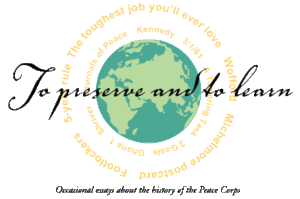Remembering Moritz Thomsen (Ecuador)
Back in 1990, shortly before his death from cholera, I interviewed Moritz for then newsletter, Peace Corps Writers & Readers. Moritz who had been a PCV in Ecuador from 1965-67, had written three books, all about his time in Latin America. Many consider his book Living Poor the best written account of the Peace Corps experience. When he emailed me he was living at Casilla 362, Guayaquil, Educador
Here is what Moritz wrote me, responding to one of my questions.
Moritz, you are an example of a Peace Corps Volunteer who has never come home. From your books we know your “history” over these last twenty-five years or so, but is there another reason—perhaps a mystical reason—that has kept you in Latin America.
No, no mystical reasons for staying in South America. In my younger years I was very often the kid who was the last to leave the party, now a kind of more or less alive illustration of Newton’s law of physics which states that a body at rest will remain at rest until booted in the butt by an outside force. Apparently it has to be a very strong boot because not even Ramon’s kicking me off the farm got me permanently out of the country…Though once, come to think of it, about four years ago when I was living on a little farm in Esmeraldas and awoke one morning to find practically everything robbed out of my house while I slept, I left for Quito in a rage, went to my travel agent and asked for a one way ticket to San Francisco. She examined my documents and told me I’d need a new identity care and a paper that said I had been counted in the last census; that would have meant standing in lines for several days and filling out dozens of forms and, most difficult of all, smiling for my mug shot. So I decide, “The hell with it” and went back to the coast, not to the farm, which I’ve never seen again, but to Guayaquil.
But the question reminds me of a Zen koan (if that’s the word), those riddles asked by the masters to their aspirants. This one is, ‘You have a goose inside a bottle; how do you get him out without breaking the glass.’
The answer is beautiful enough to make you weep, if you are moved to tears of beauty: you stand before your master, clap your hands with a magician’s wide gesture, and say, “He’s in.” You then repeat the magic clap and say, “He’s out.”
(Yesterday evening when I began to write this anecdote it seemed quite appropriate; this morning, wondering why, I finish the story simply because you can’t stop in the middle of a story even when everyone is yelling, “Yeah, yeah, we already heard that one.”)
I guess the point was, and not every well-made, that getting the goose into the bottle is more interesting than getting him out; especially this particular goose who would continue to nest in his pile of old feathers and other more unpleasant products even if the bottle were broken open. There is still after 25 years of newness, a beautiful strangeness in the Ecuadorian bottle.
When someone like yourself, who has lived for so long in another culture, writes about that society, are they writing from any sort of advantage: the advantage of an outsider, for example, or are you, and Paul Theroux, and any other RPCV, limited by always being a foreigner in a strange land?
I can only speak for myself in answering this question and certainly not for Paul Theroux who is a very brilliant guy and only God knows how deeply he moves into the minds of his characters. In my case it is certainly a help to live in and write about a foreign culture simple because, not understanding it, it seems new, bright, interesting, horrifying, disgusting, heartbreaking, etc. New sights jazz the curiosity and the imagination in ways that the old stale sights can never do, unless, of course, you are a real artist whose unique vision makes something new out of anything. The only thing I know about foreign culture is how I feel about it: that’s what I’ve always tried to write about; it’s the only thing I’m sure about. (Most of the time.) (Well, some of the time.)

Thank you for sharing your beautiful remembrance. Jim w, RPCV Malaya I
Thanks, Jim. More to come from a couple of good RPCV writers.
Thanks, John. Yesterday I ordered “The Farm on the River of Emeralds.” Can’t wait to begin.
Patricia
Thanks for sharing, John. Moritz’s last answer was so insightful.